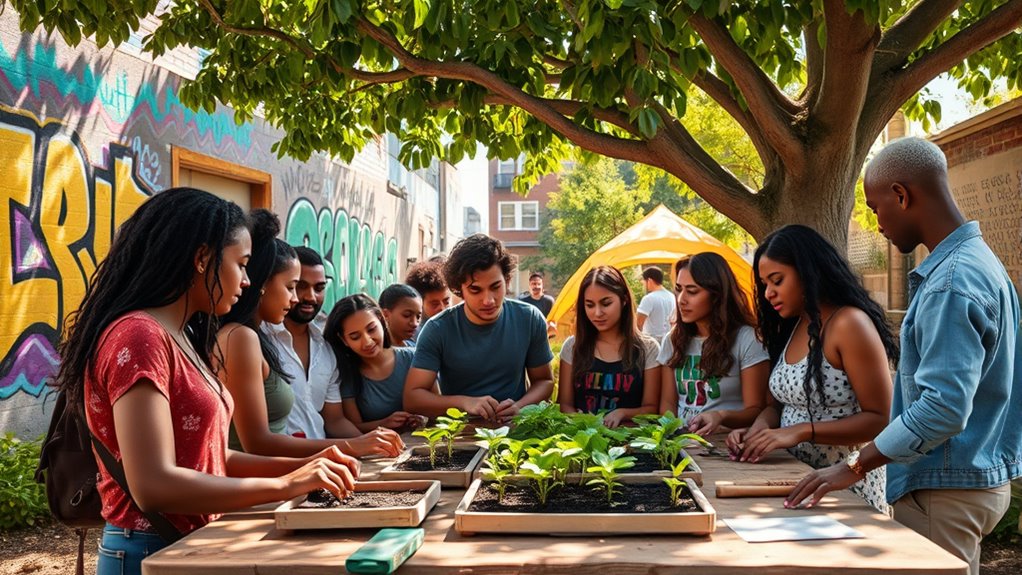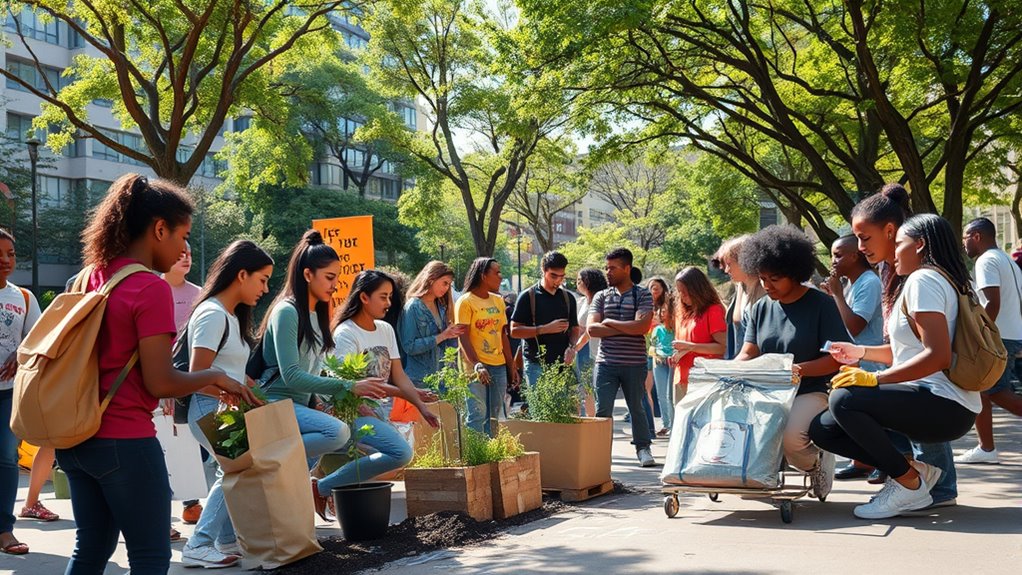To meet Gen Z’s expectations, community service should be a platform for genuine social justice. You can actively participate in initiatives that amplify marginalized voices, challenge stereotypes, and push for systemic change. Your involvement in diverse and inclusive efforts demonstrates that social justice isn’t just about volunteering — it’s about making an impact that resonates on a larger scale. Continue exploring how your actions can directly shape a fairer, more equitable society.
Key Takeaways
- Gen Z expects community service initiatives to prioritize diversity, inclusion, and representation to reflect their commitment to social justice.
- They seek opportunities that foster active participation, empowering youth to lead and influence systemic change.
- Social justice efforts must demonstrate tangible impacts, addressing issues like inequality, discrimination, and marginalized voices.
- Authentic engagement through protests, campaigns, and local actions aligns with Gen Z’s demand for meaningful activism.
- Programs that promote collaboration across diverse groups and amplify marginalized voices meet Gen Z’s desire for equitable societal transformation.

Have you ever wondered how community service can drive social justice? For many in Generation Z, it’s more than just volunteering — it’s a way to actively shape a fairer, more inclusive society. Youth activism plays a pivotal role here. You see, young people today aren’t content to sit on the sidelines; they’re stepping up, demanding change, and organizing efforts that address systemic issues. Whether through protests, social media campaigns, or local initiatives, your generation uses community service as a platform to amplify marginalized voices and challenge injustice. This activism isn’t just about awareness; it’s about tangible impact, pushing institutions to adopt policies that promote equality and fairness. Additionally, understanding the importance of color accuracy and how it enhances visual experiences can inspire you to recognize the significance of precise representation in media and communication. Diversity and inclusion are central to this movement. You naturally value representation and understanding across different backgrounds, recognizing that social justice isn’t achieved by ignoring differences but by embracing them. When you participate in community service, you’re often working with diverse groups, learning firsthand about the barriers faced by others. This exposure fuels empathy and broadens perspectives, allowing you to see social issues through multiple lenses. It’s not just about helping; it’s about listening, learning, and respecting the experiences of those who come from different walks of life. Your involvement fosters an environment where diversity is celebrated, and inclusion becomes a core principle guiding efforts for justice. Community service driven by youth activism and diversity inclusion creates ripple effects. When you stand up for causes that matter, you inspire others to get involved, creating a community of changemakers. Your actions show that social justice isn’t a distant ideal — it’s something you actively pursue through everyday efforts. By engaging in volunteer work that prioritizes marginalized communities, you help dismantle stereotypes and challenge discrimination. For example, participating in programs that support refugees, educate underprivileged youth, or promote racial equity aligns with your values and drives systemic change. Your voice, combined with the collective effort of your peers, can influence policy, shift cultural norms, and foster a society where everyone’s rights are protected. In essence, community service becomes a tool for social justice when it’s rooted in youth activism and diversity inclusion. It’s about more than just giving back; it’s about creating a movement that pushes society toward fairness and equality. Your generation’s passion and commitment matter because they reaffirm that change is possible when young people lead the way. Through this active engagement, you’re not only helping others but also shaping a future where social justice is an achievable reality for all.
Frequently Asked Questions
How Can Community Service Programs Better Engage Gen Z Volunteers?
To better engage Gen Z volunteers, you should focus on innovative outreach strategies like social media campaigns and interactive events. Emphasize experiential learning by offering hands-on projects that make a real impact. Show genuine purpose and foster community connection, making volunteering meaningful and fun. When you create engaging, memorable experiences that align with their values, Gen Z will be more motivated to participate and stay committed to your programs.
What Role Does Social Media Play in Promoting Social Justice Initiatives?
Think of social media as a digital megaphone, amplifying your voice in a crowded world. It plays a vital role in promoting social justice initiatives through viral campaigns and digital activism, making causes visible and urgent. You can rally support, share stories, and inspire action instantly. By harnessing these platforms, you turn awareness into movement, engaging Gen Z volunteers who thrive on immediacy and authenticity.
Are There Specific Causes That Resonate More With Gen Z?
You’ll find that Gen Z resonates most with causes like environmental activism and mental health awareness. They’re passionate about protecting the planet and breaking down mental health stigmas, actively engaging through social media and grassroots efforts. You can connect with them by supporting these issues, sharing stories, and encouraging open conversations. Their commitment to authentic change makes these causes especially impactful and meaningful to their generation.
How Can Organizations Measure the Impact of Community Service Efforts?
Imagine your efforts as seeds planted in fertile soil—measuring impact requires both quantitative metrics, like participation numbers, and qualitative feedback, such as personal stories. You can track engagement trends, survey volunteers for insights, and observe community changes over time. By blending hard data with heartfelt stories, you create a vivid picture of your community service’s true influence, ensuring your efforts grow stronger and more meaningful.
What Challenges Do Young Volunteers Face in Social Justice Work?
You might face challenges like volunteer burnout, which can drain your motivation over time, and cultural barriers that make it harder to connect with diverse communities. Balancing personal commitments while staying engaged in social justice work can be tough, especially if you encounter misunderstandings or resistance. To overcome these, you need support, clear communication, and strategies to maintain your passion without feeling overwhelmed.
Conclusion
By embracing community service and social justice, you can truly make a difference that resonates with your generation’s values. When you step up and get involved, you’re not just ticking boxes—you’re creating ripples of change. Remember, change doesn’t happen overnight, but if you stay committed, you’ll find that the journey is worth every effort. So, keep your eye on the prize and don’t be afraid to roll up your sleeves—your impact can be greater than you think.










